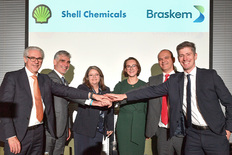- Shell will upgrade pyrolysis oils into circular feedstocks at Shell Chemicals Park Moerdijk.
- Braskem will convert these feedstocks into circular polypropylene in Wesseling, Germany.
- Chemical recycling converts plastic waste into pyrolysis oil, an alternative to virgin fossil feedstock.
- Braskem aims to achieve 1 million tons of products with recycled material by 2030.

Agreement Overview
Braskem Netherlands B.V. and Shell Chemicals Europe B.V. have signed an agreement to produce circular polypropylene from mixed plastic waste. Shell will upgrade pyrolysis oils into virgin-quality circular feedstocks at the Shell Chemicals Park Moerdijk in the Netherlands. Braskem will then convert this feedstock into circular polypropylene at its plant in Wesseling, Germany.
Chemical Recycling Process
Chemical recycling is a process that complements traditional mechanical recycling by converting plastic waste unsuitable for mechanical recycling into virgin-quality raw materials. The initial step involves transforming plastic waste into pyrolysis oil, which serves as an alternative to virgin fossil feedstock. This pyrolysis oil is then processed into propylene and ethylene, which can be further converted into new, virgin-quality circular plastics.
Sustainability Goals
This agreement aligns with Braskem's goal to increase the share of sustainable feedstock in its portfolio. The circular polypropylene will be marketed under the Wenew brand, which consolidates Braskem's efforts towards a circular economy. By 2030, Braskem aims to produce 1 million tons of products with recycled material and recover 1.5 million tons of plastic from the environment.
Market Applications
Braskem is collaborating with its partners to launch circular polypropylene products for specific market applications, including packaging and automotive sectors.

